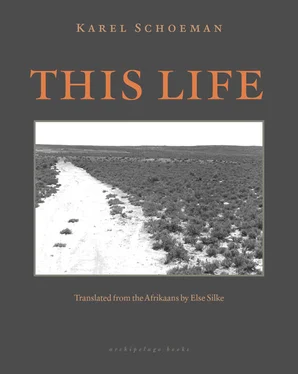Karel Schoeman - This Life
Здесь есть возможность читать онлайн «Karel Schoeman - This Life» весь текст электронной книги совершенно бесплатно (целиком полную версию без сокращений). В некоторых случаях можно слушать аудио, скачать через торрент в формате fb2 и присутствует краткое содержание. Год выпуска: 2015, ISBN: 2015, Издательство: Archipelago, Жанр: Современная проза, на английском языке. Описание произведения, (предисловие) а так же отзывы посетителей доступны на портале библиотеки ЛибКат.
- Название:This Life
- Автор:
- Издательство:Archipelago
- Жанр:
- Год:2015
- ISBN:978-0-914671-16-9
- Рейтинг книги:5 / 5. Голосов: 1
-
Избранное:Добавить в избранное
- Отзывы:
-
Ваша оценка:
- 100
- 1
- 2
- 3
- 4
- 5
This Life: краткое содержание, описание и аннотация
Предлагаем к чтению аннотацию, описание, краткое содержание или предисловие (зависит от того, что написал сам автор книги «This Life»). Если вы не нашли необходимую информацию о книге — напишите в комментариях, мы постараемся отыскать её.
considers both the past and future of the Afrikaner people through four generations of one family. In an elegiac narrator's tone, there is also a sense of compulsion in the narrator's attempts to understand the past and achieve reconciliation in the present. This Life is a powerful story partly of suffering and partly of reflection.
This Life — читать онлайн бесплатно полную книгу (весь текст) целиком
Ниже представлен текст книги, разбитый по страницам. Система сохранения места последней прочитанной страницы, позволяет с удобством читать онлайн бесплатно книгу «This Life», без необходимости каждый раз заново искать на чём Вы остановились. Поставьте закладку, и сможете в любой момент перейти на страницу, на которой закончили чтение.
Интервал:
Закладка:
At last only old Dulsie remained on whom Stienie as a young housewife could exert her will. By that time the old woman was totally confused and almost blind, but she had raised us and Father before us, and we were used to her, so that she still occupied her place in the corner of the kitchen, her pipe clenched between her teeth, without anyone taking notice of her muttering. However, Stienie maintained that the old woman scared her, and that she was dirty and smelly, and at last she succeeded in having Dulsie moved out to a small room behind the shed where one of the kitchen maids was told to take care of her. I often took her her food myself, though Stienie did not approve, and sat with her in her stuffy, smoky room for a while, but she no longer recognised me and she probably did not even notice when Mother and I moved to town. She died while we were in town, and I do not even know under which of the stone mounds in the graveyard she lies. Did Maans bury her inside or outside the wall, and would he still be able to point out the place today if he were asked?
Thus we lived together on the farm for a few years, Mother and Maans and Stienie and I, but there were many interruptions when Mother and I went to stay in the town house. It could not have been easy for Mother to see Maans, the apple of her eye, so completely under Stienie’s thumb, for though he remained loving and considerate towards her, Stienie also invaded that relationship relentlessly, and though Maans still discussed farm matters with Mother as of old, it was Stienie’s opinions he expressed, her advice or assurances he listened to, and more and more often Stienie would act as go-between and mediator between Mother and her grandson. Early on everyone naturally expected that there would soon be a baby, and when that did not happen, Mother became impatient and disgruntled, and then it was almost as if she lost interest in Maans and Stienie, just as she had stopped taking an interest in the farm after Father’s death, and once again she retired to the town house and consoled herself with the life-style and status she enjoyed there. Two or three years after Maans’s marriage — or perhaps it was not even that long, I no longer know — it was more or less wordlessly decided that she would establish herself in town permanently, and equally wordlessly it was presumed that I would accompany her. It is very wise of her, the guests in the voorhuis declared, nodding over their coffee cups; after all, she was no longer young and life here in the new town house would be much more convenient than on the farm, with her daughter to look after her and the church and even a doctor close by. Perhaps; but while they spoke like that, I watched them and noticed how they would pause for a moment and glance at Mother sharply, as if giving her a chance to contradict them and confirm their suspicions about the move. They believed Stienie was behind it, but though they dearly wanted their suspicions confirmed, Mother kept silent. Perhaps the comforts and the church and the doctor did play a role, but in town our lives were not really very different. By the time we moved, Mr Aling had already received his demission, so that for the next five years the congregation was without a minister yet again, and though it was true that there was now a doctor, he never came to our house, not until the end, when Mother was undeniably dying and allowed us to send for him at last.
But whatever the case might have been, Mother decided, and so the two of us moved to town. At first we still went down to the Karoo with Maans and the rest, but in later years Mother did not feel up to it any more and we stayed in the Roggeveld for the winter. Of course Maans and Stienie always came to stay when they were in town, though these visits gradually became less frequent too, for during those years the road down Verlatekloof was constructed and the railway line ran from Worcester to Matjiesfontein in the Karoo, and more and more often we heard that Maans had taken Stienie down to catch the train to Worcester. She visited friends there and shopped, and she always maintained that she had to see the doctor, as if our local doctor could not be trusted. People had a lot to say about this, but it is true that she often complained and, after all, why should she not go to Worcester if it made her happy, for they were still childless and there were no compelling duties to keep her at home. In due course she sent for one of her relatives, a widow, to live with them on the farm, and when she was away old Betta was left in charge and looked after Maans. He came to visit us in town regularly, but we hardly ever saw Stienie except at Nagmaal, and over the years it was almost as if we had become strangers to each other.
For ten years Mother and I lived together in town. Could it possibly have been that long? But it could easily be verified — we came to town in the spring after Mr Aling’s departure and Mother died in the same year as Mr Reyneke’s wife; the date of her death can be seen on her tombstone. The arrival of visiting ministers and later the regular Nagmaal services when we had our own minister, the post-cart bringing letters once a week and the periodic arrival of itinerant traders and transport-riders, those were the milestones of our existence and weeks and months often passed without any other interlude, so that the weeks and months and finally also the years melted together and, looking back, I can scarcely believe that Mother and I spent ten years together in that big town house.
It was a good time for Mother. The town was not big, but there were distractions we had not known on the farm, with visitors from other villages, people coming in from the farms, and neighbours dropping in. Even during her last years Mother could not have been considered sociable but, unlike before, she now enjoyed it when callers arrived unannounced — for it was always others who came to her, never the other way round. Visiting ministers or other distinguished guests were entertained by us as a matter of course, often spending the night, and she enjoyed the opportunity to impress them with the decanters, the coffee cups and other tokens of our wealth. Moreover, during the years we were without a minister, the elders would often solicit our help with some document that I had to write or read or translate, or a news report that needed interpretation, just as when Father was still alive. They were still a bit resistant and reluctant, for though I was nearly middle-aged, I was still a woman, after all, and they disliked the idea that I knew more and was capable of more than they who were men in important positions. But, as I have said, in the years after Mr Aling’s departure, when there was neither minister nor parsonage, our town house filled that gap, and it was at the regular meetings in our voorhuis that church matters were discussed and finally also, I might say, concluded. If I look back over the years with complete honesty, I would not describe Mother as devout or even as a particularly religious person, notwithstanding the claims made in the eulogies after her death, but as Father’s widow, as a leading member of the congregation and a strong-minded woman, she exercised an exceptional influence in her own way.
Was that what Mother had finally wanted — the wealth, the status and the power in this restricted environment of town and congregation? I think so. Or perhaps it was not so much the money and the status and the power, as the security these provided, the fact that those people with the wild eyes, the shabby wagon and the scrawny dogs were finally banished to the shadows for good, outside the circle of lamplight where she was entertaining her guests in the voorhuis; perhaps that was the reason for her greater tolerance, the knowledge that the battle had been fought and the desperate effort of all those years was no longer necessary, the last spirits of the past having been exorcised. Only once did she flare up as in the old days, when Mr Van der Merwe came to us as minister, and in his zeal to straighten out the neglected congregation, reopened the question of her seat among the wives of the elders. It was the beginning of a long and bitter battle with wide repercussions that divided the congregation anew, and our home was the scene of much lively debate, and many heated and unruly discussions occurred, for Mr Van der Merwe was quick to make enemies and Mother soon used the conflict to her own advantage. Exactly what was said and done, how they negotiated and planned and schemed, I never knew, for I busied myself in the kitchen or in the garden and took no part in it; but Mother retained her seat in church, and during the short time Mr Van der Merwe served in our congregation he never once set foot in our house, though his wife sometimes called on Mother.
Читать дальшеИнтервал:
Закладка:
Похожие книги на «This Life»
Представляем Вашему вниманию похожие книги на «This Life» списком для выбора. Мы отобрали схожую по названию и смыслу литературу в надежде предоставить читателям больше вариантов отыскать новые, интересные, ещё непрочитанные произведения.
Обсуждение, отзывы о книге «This Life» и просто собственные мнения читателей. Оставьте ваши комментарии, напишите, что Вы думаете о произведении, его смысле или главных героях. Укажите что конкретно понравилось, а что нет, и почему Вы так считаете.












